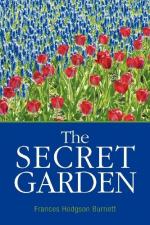Mary looked at it, not really knowing why the hole was there, and as she looked she saw something almost buried in the newly-turned soil. It was something like a ring of rusty iron or brass and when the robin flew up into a tree nearby she put out her hand and picked the ring up. It was more than a ring, however; it was an old key which looked as if it had been buried a long time.
Mistress Mary stood up and looked at it with an almost frightened face as it hung from her finger.
“Perhaps it has been buried for ten years,” she said in a whisper. “Perhaps it is the key to the garden!”
CHAPTER VIII
THE ROBIN WHO SHOWED THE WAY
She looked at the key quite a long time. She turned it over and over, and thought about it. As I have said before, she was not a child who had been trained to ask permission or consult her elders about things. All she thought about the key was that if it was the key to the closed garden, and she could find out where the door was, she could perhaps open it and see what was inside the walls, and what had happened to the old rose-trees. It was because it had been shut up so long that she wanted to see it. It seemed as if it must be different from other places and that something strange must have happened to it during ten years. Besides that, if she liked it she could go into it every day and shut the door behind her, and she could make up some play of her own and play it quite alone, because nobody would ever know where she was, but would think the door was still locked and the key buried in the earth. The thought of that pleased her very much.
Living as it were, all by herself in a house with a hundred mysteriously closed rooms and having nothing whatever to do to amuse herself, had set her inactive brain to working and was actually awakening her imagination. There is no doubt that the fresh, strong, pure air from the moor had a great deal to do with it. Just as it had given her an appetite, and fighting with the wind had stirred her blood, so the same things had stirred her mind. In India she had always been too hot and languid and weak to care much about anything, but in this place she was beginning to care and to want to do new things. Already she felt less “contrary,” though she did not know why.
She put the key in her pocket and walked up and down her walk. No one but herself ever seemed to come there, so she could walk slowly and look at the wall, or, rather, at the ivy growing on it. The ivy was the baffling thing. Howsoever carefully she looked she could see nothing but thickly-growing, glossy, dark green leaves. She was very much disappointed. Something of her contrariness came back to her as she paced the walk and looked over it at the tree-tops inside. It seemed so silly, she said to herself, to be near it and not be able to get in. She took the key in her pocket when she went back to the house, and she made up her mind that she would always carry it with her when she went out, so that if she ever should find the hidden door she would be ready.




